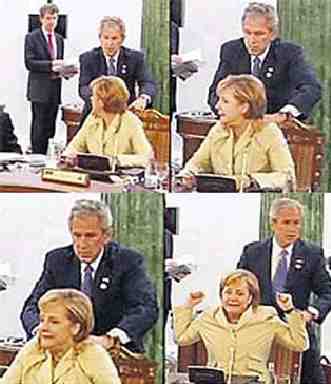
Bush as the College Boy Joker never fails to give the media plenty of "Mock Me!" ammunition. In the vid-capture sequence above, he gives Germany's Chancellor Merkel an unwelcome 'massage'.
A fascinating insider account from Newsweek on how US President Bush handled the eruption of events in the Middle East - Israel Vs Lebanon, Israel Vs Hamas, the world's reaction to Israel's pummelling of the Lebanese - as the G8 in Russia unfolded.
The story is actually more interesting for its glimpses into the interactions between the G8 leaders and the endless dithering and negotiations they all indulge in simply to come up with a short statement on what has exploded between Israel and Hizbullah.
Most people would assume that the world's leaders are in control of the world, as it were, but they are portrayed in this story as almost simply standing by, watching what happens, wondering what to do, and coming up with few answers. You can't help shake the feeling : no-one is driving the bus, and it's heading towards a cliff.
Some essential highlights from the long feature story :
While Washington was sleeping the night before, yet another corner of the Middle East had erupted into violence, after Hizbullah launched a deadly ambush on an Israeli patrol. The summit, which was supposed to focus on Iran's nukes and Russia's democracy, had just been hijacked by the war on terror.
After five years of terrorism and bloodshed, crisis has become a way of life for George W. Bush.
Back home, he usually has the luxury of managing events in private, with his aides close at hand and world leaders a phone call away. This time it's just the opposite: Bush must respond to the violence in the full glare of a global summit, where the leaders like to take each other's measure in front of the cameras.
Over the next several days, Bush huddles with presidents and prime ministers, showing how far he has traveled since 9/11—and also how little he has changed.
Bush thinks the new war vindicates his early vision of the region's struggle: of good versus evil, civilization versus terrorism, freedom versus Islamic fascism. He still believes that when it comes to war and terror, leaders need to decide whose side they are on.
But after Iraq, many of those leaders find it hard to rush to Bush's side, and he has struggled to win them back. Over the past three years, since the invasion, his options have narrowed;
circumstances have taught him to speak the language of diplomacy more fluently.....Secret Service agents believe the president and his aides are under surveillance at all times. They have ordered White House staffers to hand in their BlackBerrys and cell phones so Russian spies can't track their conversations. Russian security refuses to allow a sweep for bugs at "the cottage"—a McMansion-style villa complete with a pool and weight room.
Hovering above the ground nearby is a white communications balloon that Bush's aides believe is recording everything they say outdoors. The only totally secure place is the president's armored, soundproofed limo, which the White House has airlifted to Russia.
Inside one of the cottage's rooms, the Secret Service has set up a black tent, where aides can handle classified documents out of sight of any cameras buried in the walls or furniture.
Newsweek asks (Bush) whether (Russian president) Putin maintains his dour KGB face in private, or whether he is more relaxed behind closed doors.
Bush looks up at the spy balloon and states clearly, "That's your phrase, not mine."
Bush knows that Russia has a special relationship with Syria and Iran, and he urges Putin to intervene.
"Any time a nation is attacked by terrorism, they have the right to protect themselves," Bush says to Putin, using terms that the Russian president understands well from his own conflict with Chechen rebels. "It will be very useful to remind Syria they have an obligation to rein in these people, and Iran as well."
Bush finds the lengthy summit sessions almost unbearable. The negotiations were concluded long ago, and all that's left is a procession of windy statements—which some of the other leaders endure better than Bush.The atmosphere turns chilly on the last day in Russia, and not just because the weather grows cold and wet. At their final lunch, the leaders sit down with outsiders, including U.N. Secretary-General Kofi Annan.
Bush is frustrated that Annan wants an Israeli ceasefire before Hizbullah has returned the abducted soldiers and stopped firing rockets—as the G8 leaders have just agreed.
"What they need to do is get Syria to get Hizbullah to stop doing this shit, and it's over," Bush tells Blair. His comments should have stayed private; instead, they are piped to journalists outside.
But as the crisis in Lebanon deepens, Bush's allies and critics question the depth of his commitment to diplomacy.
Is he really embracing the United Nations or using the slow diplomatic process to buy more time for Israeli forces to destroy Hizbullah? Will the support he has rallied among moderate Arab states survive another week of Israeli airstrikes?
In his own mind, he's simply doing what much of the world has long urged him to do: build a coalition.
Bush : "What you're seeing is a foreign policy that works with friends and allies to solve problems. It takes a while for a problem to occur and it takes a while to solve a problem."
He sure got that right. The discussions between the most powerful leaders of the world, their 'united' statements on the events in the Middle East, and their desires for it all to end quickly, made no difference at all to the people of Israel and Lebanon.
More died in the days after the G8 finished than in the four days of the event itself and a ceasefire, or even a scaling back of the attacks and the violence, is no closer to becoming a reality.